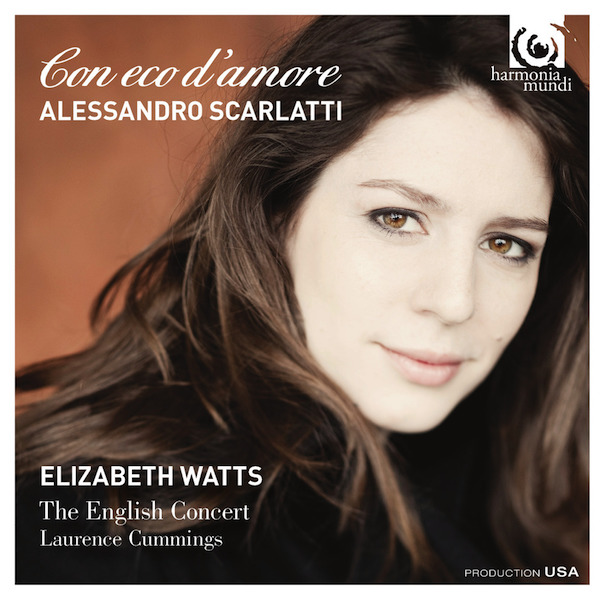Classical CD Review: “Con eco d’amore”—Elizabeth Watts sings Scarlatti
Elizabeth Watts’s voice is as clear as crystal in every musical context and texture, capable of fantastic flights of virtuosic excess but equally at home in music of great inwardness and spiritual depth.

By Jonathan Blumhofer
There are quite a few good things going for Con eco d’amore, soprano Elizabeth Watts’s new, all-Scarlatti album with the English Consort on Harmonia mundi (HM). But the biggest is probably her voice: clear as crystal in every musical context and texture, capable of fantastic flights of virtuosic excess but equally at home in music of great inwardness and spiritual depth, full of tonal warmth, and featuring a vibrato that’s only employed with impeccable control and taste; it fits this style so well that the experience of listening to her performance is first and foremost a pleasure.
So, too, is the opportunity to hear such a wide collection of music by Scarlatti pere (fils Domenico is the better-known half of the family, with his copious output of keyboard works). Unlike his son, Alessandro wrote relatively little instrumental music: his focuses were the voice and, particularly, the theater, for which he penned (by his estimate) somewhere around 100 operas. Arias from seven of them, plus selections from Scarlatti cantatas, serenatas, and oratorios fill out Watts’s program.
And between the 16 selections, they provide Watts ample opportunity to show off her dramatic and musical chops. She turns in beautiful, affecting accounts of “Nacque, col Gran Messia” and “A questo nuovo affanno” (gently accompanied by a reduced ensemble in the latter). And Watts uses the concentrated, narrow melodic focus of “Mentr’io godo in dolce oblio” (from La Sentissima Vergine del Rosario) to her advantage, singing with a tone of great pliancy and feathery lightness, while also conveying a mighty inner strength. It’s downright haunting.
None of Scarlatti’s virtuosic music is easy, by any means, certainly not “Torbido, erato, e nero,” which became one of the castrato Farinelli’s signature numbers. Watts sings the aria here with great passion and agility, though some of the climaxes feel a bit forced. And, if there’s a flaw in any of her readings, that’s just it: in fast, florid selections they can take on an uncomfortable edge, a weightiness that keeps them from confidently achieving lift. It happens at times in “Torbido” and also in “Figlio! Tiranno!” (from Griselda), whose fires burn hot and border on (but never quite cross the line into) becoming uncontrollable.
Still, personality abounds on this disc, both in the music and the performances. Watts triumphs in a quicksilver duet with trumpeter Mark Bennett in “Se geloso è il mio coro,” which hails from the serenata Endimione e Cinta, a genre of music popular in the early 18th century for pitting virtuoso instrumentalists and singers against each other. “Con voce festiva” sings with lilting energy and warmth. And Watts turns in a stately “Ergiti, Amor, su I vanni” (from Scipione nelle Spagne).
Throughout, Laurence Cummings and the English Consort deliver accompaniments that are light on their feet, texturally lucid, and abounding in color and energy. In addition to “Se geloso,” trumpeter Bennet takes a lively solo turn with Watts in “A battaglia” (from A Battaglia, pensieri) and violinist Huw Daniel makes the most of his mini-concerto in “Esci omai” (from Mitridate Europate).
Jonathan Blumhofer is a composer and violist who has been active in the greater Boston area since 2004. His music has received numerous awards and been performed by various ensembles, including the American Composers Orchestra, Kiev Philharmonic, Camerata Chicago, Xanthos Ensemble, and Juventas New Music Group. Since receiving his doctorate from Boston University in 2010, Jon has taught at Clark University, Worcester Polytechnic Institute, and online for the University of Phoenix, in addition to writing music criticism for the Worcester Telegram & Gazette.
Tagged: Alessandro Scarlatti, Con eco d’amore, Elizabeth Watts
